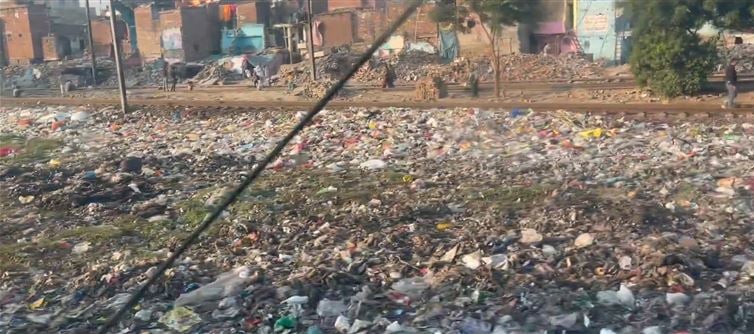
The Smell of Failure Travels Faster Than the Train
Stand near New delhi Railway Station for five minutes.
You’ll see the future india dreams of — high-speed trains, wallet PLATFORM' target='_blank' title='digital-Latest Updates, Photos, Videos are a click away, CLICK NOW'>digital displays, and passengers carrying smartphones. But beneath the wheels of progress lies the rot we’ve learned to ignore: garbage, stench, and neglect.
The sight is more than unhygienic — it’s symbolic.
Because if the national capital, with all its power, money, and visibility, can’t stay clean, then what hope do Bharat’s smaller towns and villages have?
It’s time we admit it — Swachh Bharat was not a failure of initiative. It was a failure of discipline, design, and civic sense.
Swachh Bharat 2.0: Begin Where the Stench Starts
Forget the posters, slogans, and celebrity endorsements.
If Swachh Bharat is to be reborn, it must start from where India’s decay is most visible — the areas around railway tracks.
Railways are the arteries of the nation, connecting 8,000 stations and over 13,000 trains daily. But those arteries are clogged — not by traffic, but by trash.
The journey from delhi to Patna, mumbai to Varanasi, or chennai to kolkata is a moving documentary of India’s waste crisis — plastic bags fluttering on tracks, piles of leftovers tossed out of trains, and open drains turned into dumping sites.
Swachh Bharat cannot claim victory until the railway tracks — the most visible symbol of India’s movement — stop looking like open landfills.
The Missing Ministry: Why india Needs a Department of Civic Sense
We have ministries for steel, textiles, and even animal husbandry. But not one for Civic Sense — the foundation of every developed society.
Because this is not merely a cleanliness problem.
It’s a cultural and behavioral collapse.
indians sweep their homes spotless — but litter the street outside. They clean their puja rooms — but throw plastic garlands into rivers. They build temples of marble — but live among piles of waste.
We don’t lack resources; we lack responsibility.
And that’s why india doesn’t just need Swachh Bharat — it needs a Department of Civic Sense, empowered to educate, enforce, and engineer better habits through policy, design, and consistent social messaging.
If a child grows up seeing their parents litter, they don’t just inherit garbage — they inherit indifference.
Smart Cities, Dirty Realities
Every government loves to talk about Smart Cities.
But a city can’t be smart if its citizens aren’t sensible.
What’s the point of building metro networks, airports, and bullet trains if the moment you step outside, you see heaps of garbage rotting under flyovers?
The New delhi Railway Station, a gateway to the capital, looks less like a transport hub and more like a forgotten dumping ground. The platforms gleam — but one step outside, the air turns foul.
No traveller — indian or foreign — should have to witness that contrast.
Because cleanliness is not a luxury; it’s the minimum expression of self-respect.
The Need for a Conveyor System: Thinking Beyond Brooms
india cannot broom its way out of this mess.
We need engineering, not emotion.
The solution isn’t more slogans — it’s systems.
A nationwide conveyor and segregation system that separates biodegradable waste from non-recyclables at the point of collection.
Biodegradable waste can be composted into fertilizer. Non-recyclables can be converted into energy or safely processed.
This is the difference between a campaign and a civilization.
The West never had to face this challenge at scale — they had fewer people, more land, and decades of infrastructure investment.
India doesn’t have that luxury.
Which means Bharat must invent — not imitate.
This is a call to engineers, entrepreneurs, and policy visionaries to design from first principles — solutions that work for Bharat and Africa, where the population density is high, resources are limited, and civic systems are under strain.
Garbage Is Not Just Waste — It’s a Mirror
The garbage outside New delhi Railway Station is not an accident — it’s a mirror.
A mirror that shows us what happens when a society loses collective responsibility.
A mirror that asks: how can we dream of space missions and trillion-dollar economies when we can’t manage our own streets?
We celebrate building the world’s tallest statues — yet fail to manage the smallest dustbins.
We clap for cleanliness drives once a year — then go back to normal the next day.
It’s not just sad.
It’s shameful.
From Policy to Pride: Cleanliness Must Become a Civic Identity
A clean nation is not built by cleaners.
It’s built by citizens who care.
We need civic education from kindergarten to college, with behavioral nudges that make littering socially unacceptable.
Every street should have marked segregation bins. Every neighborhood should be monitored through civic councils that reward good behavior, not just penalize bad behavior.
Because true cleanliness is not about impressing others — it’s about respecting ourselves.
The Bottom Line: The capital Stinks, But the Solution Starts Here
If the capital of the nation cannot stay clean, then no policy, no campaign, and no slogan will save the rest of Bharat.
Swachh Bharat must restart — not as a photo-op, but as a national engineering and behavioral revolution.
And it must begin where the problem is most visible — along the railway tracks, beside the stations, beneath the overpasses, where Bharat’s neglect runs deepest.
The question isn’t “Who will clean India?”
It’s “When will indians stop creating the mess?”
Until we answer that, no train, no metro, and no campaign will take us where we dream of going.




 click and follow Indiaherald WhatsApp channel
click and follow Indiaherald WhatsApp channel